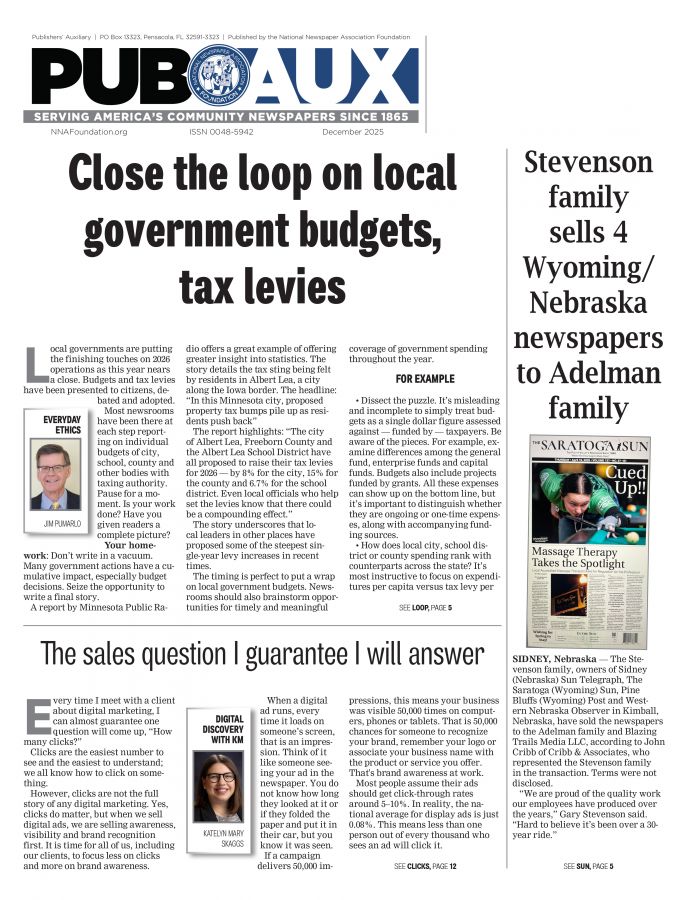Tips on what to do and what NOT to do
Chip Hutcheson
Sep 1, 2023


The publisher walked into the staff meeting. The newspaper was losing money, and some employees were fearful of losing their jobs. As a result, morale was at an all-time low. The boss told the managers that he was determined to fix the low morale problem.
“What we need around this office is humor — humor will lift the morale!” he exclaimed.
Turning to the ad manager, he said, “Humor — let's start with you. Knock. Knock.”
The manager sheepishly answered, “Who's there?”
“Not you anymore,” the boss replied. Bad idea — NOT funny.
Lots of people in the newspaper industry are suffering with low morale — living in fear and anxiety. They hear all the doom and gloom that pervades the industry. They hear the horror stories of news deserts and fear that their community might be the next to bear that label. They are living like the deep sea diver who got the message on his headset, “Come up quick; the ship is sinking!”
This month Pub Aux is carrying some articles on the human resources topic. It’s not a trade secret that the newspaper industry nationwide has a human resource problem — there are not enough humans in the workplace to get the job done the way it needs to be done. But let’s be quick to acknowledge that problem is not limited to newspapers. There are not enough teachers, nurses, electricians, plumbers, truck drivers — you name it, and there’s a shortage. Often, the reason is blamed on the pay not being high enough, but even significant increase in wages hasn’t solved the problem.
Most businesses have hiring problems, but that’s no solace for newspapers. What’s the answer to avoid being the sinking ship?
There are often a flood of words about the problem but a famine of ideas on how to solve it. This article doesn’t pretend to have the answers, but hopefully will provide some food for thought.
• For independently owned papers, thinking ahead is crucial. If your editor, reporter, sports editor or ad salesperson leaves, you should not only have some potential candidates in mind to fill those shoes, but you should have already begun conversations to pique the interest of possible hires. If those positions are vacant for any period of time, someone — perhaps you — will be forced to fill the void. Adding those responsibilities to an already-busy schedule is not sustainable for the long haul. You’ll likely find you are too exhausted to run and too scared to rest.
Face the fact that the workload at newspapers is greater today than ever. Most staffs have had substantial cuts. Couple that with the reality that the jobs demand more. Sports editors in bygone years focused on football, basketball and baseball during the school year, but now there’s soccer, volleyball, softball, wrestling, golf, cross country, track, and the list goes on. The time demands are almost incomprehensible — and the person taking that job must be one fully dedicated and committed. Finding a good freelance photographer for sports could be an option — perhaps several, including a parent who has a child playing in those sports. Never be afraid to ask help from the community. Many people would rather lend a helping hand rather than see the newspaper fold.
Reporters also find their plates are full. The regular schedule of meetings — city council, county government, school board — just scratch the surface. Unfortunately, too many reporters are thrown into the fray of hard news coverage without being mentored and often miss the mark in explaining how actions taken directly affect the readership. In a small community environment, you probably are not going to find someone with reporting skills. But if that person has a genuine interest in the welfare of the community, consider making the hire, and then begin the task of teaching that person how to do the job.
Ad sales personnel face a different challenge. Competition has changed dramatically since the dawn of this century. No longer is the chief competitor another newspaper or even a radio or TV station; it’s social media and websites. What has not changed in ad sales is the tendency of the salesperson to spend a great deal of time focusing on — to the point of obsessing over — the perceived competition. The successful ad person will focus on what their newspaper can provide and validate it with testimonials. It does no good to try to diminish the competition. Rather, focus on what your newspaper does well and play to that strength.
We’ll devote a future column to time management, but for now, consider that when you are up to your ears in crocodiles, that is not the time to worry about draining the swamp. Focus on finding capable talent in your community, and then share your vision for how a new employee can find satisfaction by working for the newspaper.
As I look back on my 41 years as a publisher, there’s one aspect from the human resources angle where I often failed. It took me more than 30 years to understand that some of my fellow employees did not rank as high as I would like on being passionate about their jobs. So when I put them in the position of putting the job ahead of their family, it did not go well — and some moved on because of it. For the workaholic publisher/owner, it’s vital to accept the fact that those who work for you might want to have a life outside the newspaper office. You’ll find employees will stay with you longer when you encourage them to take their allotted vacation time and ask them to not overly sacrifice their family time for their job. Let them know the expectations of the job, and put your trust in them to figure out how to balance the job with family, health and recreation.
Any boss/manager should try to walk in the other person’s shoes in order to see what motivates each one and use that understanding to make the employee understand their value to the newspaper and to the community it serves.
• For chain-owned newspapers, the situation is much more difficult. Far too often, there are regional publishers who may have multiple newspapers under their authority, and those publishers don’t have the luxury of being able to look ahead for the purpose of filling potential vacancies.
That reality doesn’t lend itself to keeping a dedicated staff because, in many cases, there’s no one at the helm in those satellite offices. Developing esprit de corps is a much more daunting challenge in that environment. It can be done, but it requires a solidly entrenched employee in each location who is given authority to be watchful for potential candidates, and who is willing to take an ownership interest — even though they have no financial stake in the company.
For the latter part of my newspaper career, I inherited several newspapers that reported to me. There was no way I could publish our twice-weekly newspaper and give those weeklies the attention they deserved. The best success story to come out of that was when a 30-ish reporter at a nearby daily was planning on leaving the business to stay be a stay-at-home mom. I asked her to meet me at a weekly in a much-smaller community. The pitch was this: you have established yourself as a more-than-capable writer and photographer. If you take this position as editor, treat this newspaper as your own. Call me if you have any questions or need any advice, but you are empowered to make decisions that you think will be best for the newspaper and the community.
Not only did she accept the job, but she fell in love with the town, prompting her and her husband and their four children to move 25 miles so they could be more actively involved in the community and school system.
It seems that stories like that are few and far between these days. The best advice I’ve found is to let a job candidate know you have confidence that the person can do the job, that you will support and mentor them and that you genuinely care that they succeed. Job satisfaction based on those premises will help the person ride through the difficulties that are inherent in this business.
Chip Hutcheson is the retired publisher of The Times Leader in Princeton, Kentucky. He was NNA president in 2015. He currently serves as a content strategist for Kentucky Today, the online news website of the Kentucky Baptist Convention. chiphutcheson@yahoo.com










